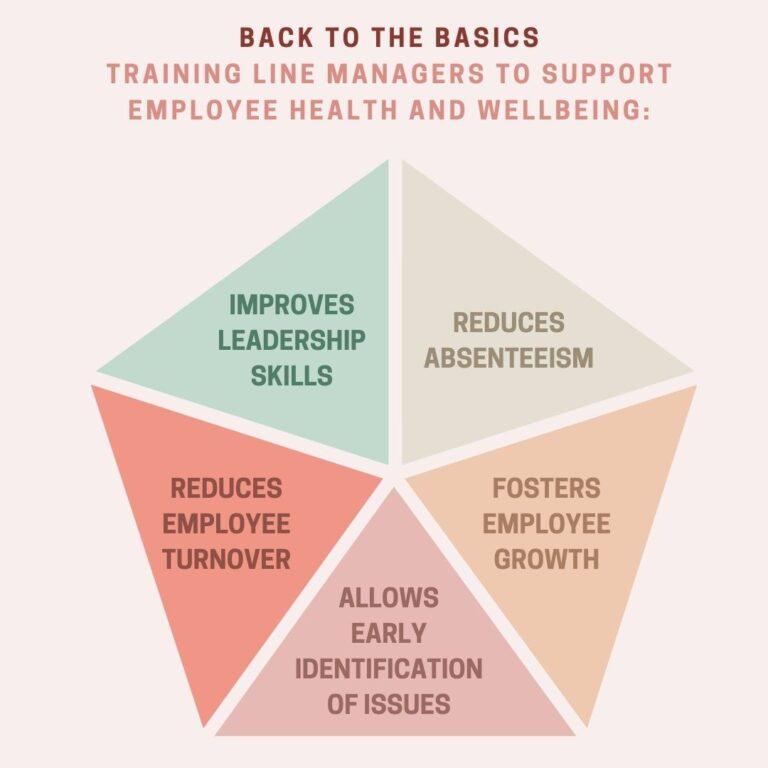As direct supervisors, line managers play a pivotal role in creating an organisation-wide workplace culture that supports the health and wellbeing of their team members. In order to create a thriving workplace, senior management must ensure that line managers are equipped with the necessary skills and training to successfully manage their responsibilities for employee health and wellbeing.
But how exactly can you achieve this? Thrive4Life is here to help line managers feel empowered to support their team members’ physical and mental health. In this fourth instalment of our line management blog post series, we’re focusing on the importance of line management training, providing tips on how to effectively implement a training programme for line managers that optimises employee happiness, health, and productivity.
Share this page on your Social Media!
With the correct training, line managers can shape a team who feel motivated, productive, and inspired – all because they’re supported to feel their best, mentally and physically. At Thrive4Life, we know that line management training in health and wellbeing:
- Improves Leadership Skills: An awareness of their team’s health and wellbeing needs will encourage line managers to be more considerate in their policies, strive for open communication, and motivate their team members. As leaders, they should offer a sympathetic ear to their employees’ issues, be flexible when setting work goals, and inspire them to do their best. They should always act as a pillar of support for their whole team, and proper training will help them do this.
- Reduces Employee Turnover: The average cost of employee turnover in the UK was estimated to be around £11,000 in 2018. By actively addressing employees’ mental and physical health concerns and valuing their wellbeing, line managers can help avoid such immense costs for their organisation. If employees feel happier and healthier, they’ll be even more eager to grow and flourish in their workplace.
- Allows Early Identification of Issues: When line managers are adequately trained to support their team members’ health and wellbeing, they can spot early warning signs of serious physical and/or emotional health issues in their teams. Early identification of such difficulties can prevent them from escalating into more severe health risks.
- Reduces Absenteeism: Absenteeism can seriously impede the success of any business by reducing productivity levels and increasing organisational According to a study by Westfield Health, absenteeism cost UK businesses £14 billion in 2020. Workplace pressures can manifest in mental and physical health problems like stress, depression, and anxiety. These illnesses can make it extremely difficult for individuals to come into work, resulting in them taking frequent time off. By striving to create healthy work cultures, line managers can help their team members effectively manage or overcome any physical and/or mental health issues, keeping them engaged and committed to their work. These measures will positively affect the whole organisation’s output, success, and workplace culture.
- Fosters Employee Growth: When line managers are equipped with health management skills, they can share their knowledge with their team members and pass on skills to help them manage difficulties with their emotional wellbeing or physical health. Such health management guidance and expertise can help employees to thrive both personally and professionally.

Skills Training: Key Areas of Focus
At Thrive4Life, we believe that to promote employee health and wellbeing best, line management training programmes should be structured around these 4 key areas:
- Communication: Effective communication skills are needed to help line managers understand, actively listen to, and empathise with any mental and/or physical issues their team members may be experiencing. According to data from Public Health England, 1 in 3 employees living with a long-term health condition have refrained from disclosing this to their employers – this can cause serious issues for both employees and their managers. Statistics such as these show just how vital it is for line managers to encourage open communication with and amongst employees so that they can offer their support and guidance to those who are struggling.
- Health Awareness: Line managers should be trained to understand both the physical and mental health issues that their team members may face. This training should include learning to spot the signs of depression, anxiety, common allergic reactions (g., those caused by nuts), and commonplace illnesses that should see a team member take time off work to recover. Line managers should also be equipped with the information and tools necessary to direct employees to professional resources like doctors and counsellors. Once aware of a health problem a team member is experiencing, this knowledge should allow line managers to direct them to the best source of help for their issue. Health and safety training should also address physical risks and provide line managers with knowledge of safety procedures in case of emergencies like fires, gas leaks, or earthquakes.
- Risk Assessment: A comprehensive training programme should teach line managers how to conduct stress risk assessments to help them best structure their interventions. Line managers should be trained to use risk assessment tools such as Health and Safety Executive’s Work-Related Stress Assessment template. Alternatively, with Thrive4Life, line managers can work with highly-experienced Wellbeing Consultants who can guide them in developing their own risk assessments and health and wellbeing strategy.
*If your business involves manual/people handling, our sibling company, Osteopaths for Industry, also offers professional training services led by our team of highly qualified trainers. Our trainers can conduct a comprehensive risk assessment of your workplace, assessing your current risk assessment strategy and training designated employees to become in-house Risk Assessors. Previous clients include the NHS and the University of Essex.
4. Sickness Absence Management: Line managers should encourage their employees to take time off when ill. Taking sick leave should never be an added source of stress to the employee or compound the workload of them or their line manager. HR departments should support line managers by managing long-term absences, developing procedures to help employees transition back to work, and providing line managers with temporary replacements to cover for unwell employees.
By training your line managers in health and wellbeing, you’ll feel the benefits of a more engaged and productive workforce: it’s an investment that always pays off. Global companies like Nestlé are at the forefront of management training practices which prioritise employee health and wellbeing. Their employee health strategies are structured around a central focus on caring leadership. Unilever also have a Mental Health Champion Plan, which trains supervisors to be Mental Health Champions, acting as role models within the company.
If you’re not sure where to start, there are many resources which can support line manager training in employee health and wellbeing. At Thrive4Life, we believe the following methods can change your line management training practices (and the health and wellbeing of your employees) for the better:
- Developing In-House Training Programmes: Organisation-specific line manager training programmes should be designed around the key skills mentioned in the previous section. This training programme should be tailored to the business needs of your organisation, as well as the specific health needs of your This means HR Departments and line managers should collaborate to develop employee wellbeing standards that ensure and promote business growth. For example, this could mean creating situational assessments and scenario testing based on particular health management approaches. This might take the form of a mock exercise where team members share their mental and physical health struggles with line managers. The line management’s responses could then be gauged for efficacy in order to determine the best health management policies their organisation should adopt going forward. For instance, line managers will likely find that team members feel more comfortable discussing any health issues in a one-to-one discussion rather than in a group setting, surrounded by their colleagues.
- Introducing Mentors and Coaches: It couldn’t be more important to remember that line managers need guidance too! You can’t expect line managers to be health and wellbeing experts from the get-go, without adequate support. Having senior mentors to approach when deciding how to manage an issue best can be a huge source of relief for line managers. A designated senior wellbeing coach could also be assigned as a professional resource for line managers to consult when concerned about a team member’s physical/mental wellbeing. If worried or unsure how best to deal with an issue, line managers should also always be able to consult seniors within the company for guidance.
- Wellbeing Champion Training: Thrive4Life’s Wellbeing Champion Training course offers line managers the opportunity to gain knowledge in various health-related topics. These include stress management, coping mechanisms, and education about the factors which can affect the physical and mental wellbeing of individuals. By providing line managers with an overview of the holistic health management strategies they should look to adopt, this course guides individuals in their journey towards becoming certified Wellbeing Ambassadors who can confidently monitor and support their team’s health.
- Mental Health First Aid Course: Thrive4Life’s Mental Health First Aid Course offers an excellent opportunity for line managers to gain an official MHFA England certification, equipping them with the tools needed to provide in-house support to colleagues who may be struggling with their mental health. Participants in this course will also be provided with access to an MHFA learning hub, a Hub of Hope database with additional links to mental health resources, and a monthly newsletter with updates and guidance.
- Mental Health Skills Development: Once a line manager is MHFA certified, they can take part in our Mental Health Skills Development workshops to further improve and supplement their knowledge about mental health management. During these workshops, a qualified health instructor leads a ‘refresher’ course, helping line managers become aware of the latest factors that could affect their team’s mental health. Line managers are also encouraged to reflect on their journey as a Mental Health First Aider and seek bespoke, organisational-specific advice for their team’s issues and concerns.
- Ergonomic Courses: To support the physical health of their team members, line managers can attend a 1-day Ergonomic Awareness course or a 2-day Ergonomic Champions Course, both of which are conducted by our sibling company, Osteopaths For Industry. This 2-day course not only aims to improve line managers’ awareness of ergonomic risks and musculoskeletal issues in the workplace but also provides them with preventative strategies and suggestions for improving existing office practices, intending to reduce the number and severity of musculoskeletal issues experienced by employees.
- Line Management Training: Managing Stress and Mental Health: Thrive4Life offers a dedicated training course to help line managers better understand, manage, and support their employees’ emotional This dynamic 90-minute course is packed with essential information, expert tips and guidance, and practical exercises and case studies designed by seasoned mental health professionals.
These resources can help your organisation develop the most thorough, efficient, and effective line management health and wellbeing training programme possible. By attending training courses and seeking guidance from Thrive4Life’s health and wellbeing experts, line managers can quickly become more confident and informed when creating (and putting into practice) policies which impact their team’s physical and mental welfare. Once trained, line managers will not only be able to create a healthier workplace for their team members, but they’ll also grow in their own careers as they expand their expertise and skillsets.

In Summary
In fast-paced and demanding work environments, employee wellbeing cannot be an afterthought for your organisation. Focusing on your employees’ physical and mental health is imperative for success, and line managers are your key to a thriving business. When line managers are provided with adequate support and training, they not only create positive and supportive dynamics within their teams, but foster a culture of respect, empathy, and growth that can proliferate throughout an entire organisation. Any positive change is incremental: so prioritise your line manager training and watch them build a healthier, happier, and more productive workplace.
References
- How Much Does Employee Turnover Cost Your Business? [2018]. Croner.
https://croner.co.uk/resources/culture-performance/cost-of-staff-turnover/#:~:text=The%20average%20cost%20of%20employee,to%20spend%20to%20train%20them. - Mental Health Related Absenteeism in the UK. [2021]. HR Review.co.uk
https://www.hrreview.co.uk/hr-news/mental-health-related-absenteeism-cost-uk-14-billion-in-2020/131667 - Health and Work Infographics. [2020]. Public Health England.
https://assets.publishing.service.gov.uk/government/uploads/system/uploads/attachment_data/file/949524/References_Health_and_Work_infographics_v_final.pdf - Managing Stress Risk Assessment. [2022]. Health and Safety Executive.
https://www.hse.gov.uk/simple-health-safety/risk/risk-assessment-template-and-examples.htm - Wellbeing Consultancy Services. Thrive4Life.
https://www.thrive4life.co.uk/wellbeing-consultancy/ - Manual Handling Risk Assessment. Osteopaths for Industry.
https://www.ofi.co.uk/manual-handling-training/manual-handling-risk-assessment/ - Workplace Health, Wellbeing, and Safety. Nestle.
https://www.nestle.com/sustainability/people-communities/health-safety-wellbeing#:~:text=Providing%20a%20healthy%20working%20environment,eating%20and%20good%20mental%20health. - Unilever’s Mental Health Action Plan. Unilever.
https://betterworkplacemh.com/app/uploads/2021/08/Building-an-action-plan-slides.pdf - Wellbeing Champion Training. Thrive4Life.
https://www.thrive4life.co.uk/health-wellbeing-training/wellbeing-champion-training/ - Mental Health First Aider Course. Thrive4Life.
https://www.thrive4life.co.uk/health-wellbeing-training/mental-health-first-aider-course/ - Mental Health Skills Development. Thrive4Life.
https://www.thrive4life.co.uk/health-wellbeing-training/development-skills-workshop-for-mental-health-first-aiders/ - Ergonomic Training & Assessments. Osteopaths for Industry.
https://www.ofi.co.uk/ergonomic-training-assessment/ - Line Management Training: Managing Stress and Mental Health. Thrive4Life.
https://www.thrive4life.co.uk/health-wellbeing-training/line-management-training/
Please note, these are external links away from the Thrive4Life website. We are not responsible for the content of external websites.










